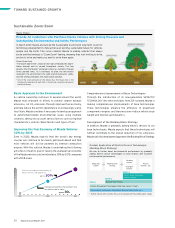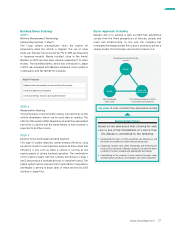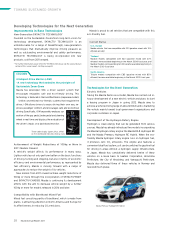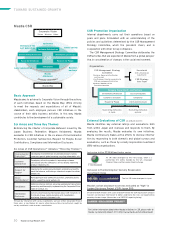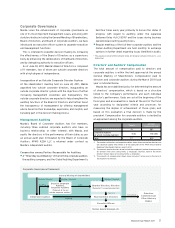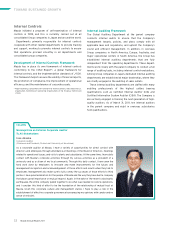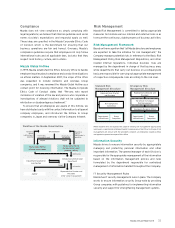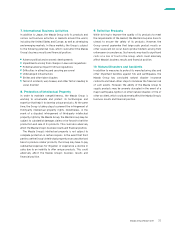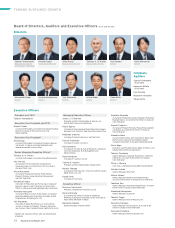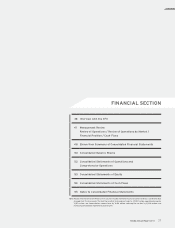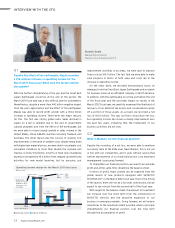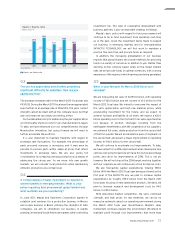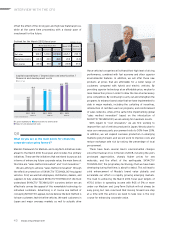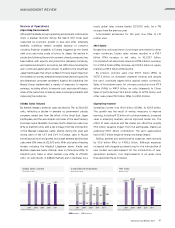Mazda 2011 Annual Report Download - page 36
Download and view the complete annual report
Please find page 36 of the 2011 Mazda annual report below. You can navigate through the pages in the report by either clicking on the pages listed below, or by using the keyword search tool below to find specific information within the annual report.
Business Risks
TOWARD SUSTAINED GROWTH
Significant risks that could affect the Mazda Group’s business
results and financial position include those listed below. This,
however, does not represent a comprehensive list of all the
risks faced by the Mazda Group.
1. E conomic Conditions Impacting
the Mazda Group
The Mazda Group sells its products in Japan and around the
world, including in North America, Europe, and Asia.
Accordingly, the Mazda Group is strongly affected by economic
trends and demand fluctuations in each of these markets. As
such, the Mazda Group strives to make accurate forecasts on
economic trends and demand fluctuations especially in major
markets. However, in the event of a sudden economic downturn
or decline in demand, it is difficult to anticipate the effects to
our business precisely. Hence, such an event could adversely
affect the results of operations and the financial position of
the Mazda Group. In addition, unexpected changes in or new
adoptions of taxation and accounting standards in various
countries could adversely affect the results of operations and
the financial position of the Mazda Group.
2. E xchange Rates, Especially the Dollar-Yen and
Euro-Yen Rates
The Mazda Group exports products from Japan to the rest of
the world and consequently its business results and financial
position are exposed to the effects of fluctuations in exchange
rates. An appreciation of the yen, particularly against the U.S.
dollar and euro, could lower the Mazda Group’s profitability
and ability to compete on price. Mazda uses forward exchange
contracts and other instruments in some of its transactions to
minimize the impact of short-term exchange rate risk. However,
a weakening of the yen could result in opportunity losses.
3. Alliances and Mergers
The Mazda Group is involved in joint activities with other
companies under technology alliances, joint ventures, and in
other forms with respect to the development, production, and
sales of products. These joint activities are designed to
optimize resources, facilitate their prioritization, and generate
synergies. However, a disagreement over management,
financial, or other matters between the parties involved could
mean that the joint activities fail to deliver the results
expected. This could adversely affect the Mazda Group’s
business results and financial position.
4. Environmental Regulations
The Mazda Group operates under a variety of legal regulations
in the countries in which it conducts business, including
regulations related to fuel economy, exhaust gases, vehicle
safety, and levels of pollutants emitted at its manufacturing
plants. The tightening of these legal regulations in the future
could lead to increased costs, which could adversely affect the
Mazda Group’s business results and financial position.
5. Market Competitiveness
The Mazda Group competes with a large number of companies
in the global automobile market. Maintaining and enhancing
the Group’s ability to compete in this environment is crucial to
ensuring growth. Consequently, the Mazda Group is
implementing a range of initiatives to boost its competitiveness
in product development, manufacturing, sales, and other
areas. However, the Mazda Group’s business results and
financial position could be affected, including declines in
market share or product prices, in the event it fails to launch
appealing products at appropriate times because of a failure
to accurately ascertain market trends or as a result of issues
related to technological capabilities and manufacturing. The
same holds true if the Mazda Group fails to take effective steps
to address or respond to changes in customers’ sense of value
through its dealership network or sales methods.
6. Procurement of Materials and Parts
The Mazda Group relies on numerous suppliers outside the
group for the procurement of materials and parts. Accordingly,
cases such as the following may lead to a deterioration in
output or higher costs, which could adversely affect the results
of operations and the financial position of the Mazda Group:
when the Mazda Group faces difficulties in procuring the
necessary level of materials and parts for volume production,
due to constraints at suppliers afflicted by disasters or
deteriorations in logistics functions, or tight supply-demand
balances, or changes to and/or breaches of supply contracts;
when prices of materials procured by the Mazda Group rise
sharply and cannot be offset by internal efforts to boost
productivity, by passing on price rises to customers, or by
other measures.
34 Mazda Annual Report 201 1




